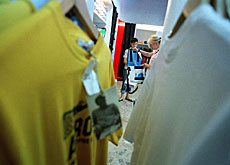Teenagers offer rich pickings for advertisers

Advertisers are increasingly targeting young Swiss consumers who are estimated to spend around SFr600 million ($461 million) a year.
But many of these youngsters are slowly sinking into debt as they struggle to finance their dream lifestyle.
“Teenagers are usually looking for their own identity,” says Petra Ogenfuss, who is studying the behaviour of young consumers at Zurich University.
“Consumer goods are one way of creating an identity and getting recognition from your peers.”
According to Ogenfuss, most teenagers’ leisure time involves spending money.
“The majority are not interested in taking a walk in the woods,” she told swissinfo.
This is a view supported by a 2003 consumer behaviour study, which showed that shopping was the most important leisure activity for 85 per cent of Swiss teenagers.
But shopping has its dangers: the same study pointed out that 25 per cent of teenagers spend more than they can afford.
“It’s a worrying trend to see so many youngsters overspending,” says Verena Maag, a sociologist and author of the first Swiss study on compulsive shopping.
Pocket money
Most Swiss parents give their children pocket money, but there are no hard and fast rules.
The Swiss Budget Advisory Association suggests children in their first school year should receive just over SFr1 every week.
The bar rises substantially for those attending high school who are said to need around SFr180 a month to pay for leisure activities, mobile phones, haircuts and clothing.
According to Margrit Krattiger, a budget adviser, this is not an unreasonable sum.
“Most parents already give their children this amount,” she told swissinfo.
“It is important for children to learn how to handle money. They need pocket money otherwise they become adults without understanding how to manage it.”
Lucrative advertising
The fact that Swiss children are now seen as an important consumer group is not lost on advertisers.
American experts claim children as young as 18 months old can recognise company logos and associate them with a product.
But youth marketing specialist Claude Bronner says a child needs to be six to eight years old before they can be considered a “consumer”.
Bronner, who heads the Lausanne-based Liquidmedia agency, produces a series of free magazines aimed at the youth market that are handed out in stores and clubs.
They carry adverts for cigarettes, alcohol, mobile phones and CDs, but also promote bank accounts, insurance and cars.
Advertising space doesn’t come cheap either: a full-page ad costs between SFr9,500 and SFr16,500 – around the same price as a mainstream magazine.
Youth market
Bronner says the youth advertising market is worth around SFr15-20 million each year in Switzerland. This rises by a further SFr10 million once handouts and flyers are factored in.
But what children and teenagers spend their money on – and based on what criteria – is a closely guarded secret.
“Many companies do market research,” says Ogenfuss, “but they don’t share their findings.”
But one thing is clear when it comes to children and money.
“Saving is out,” says Ogenfuss. “One’s image is more important than any price tag.”
swissinfo, Philippe Kropf
About one quarter of Swiss teenagers have trouble making ends meet with their pocket money, spending more than they have.
The Swiss Budget Advisory Association says a teenager needs around SFr180 each month to pay for his or her leisure activities and various purchases.
Swiss youngsters spend around SFr600 million each year, making them a lucrative target for advertisers.
In 2003, a consumer behaviour study showed that shopping was the favourite leisure activity for Swiss teenagers.

In compliance with the JTI standards
More: SWI swissinfo.ch certified by the Journalism Trust Initiative

You can find an overview of ongoing debates with our journalists here . Please join us!
If you want to start a conversation about a topic raised in this article or want to report factual errors, email us at english@swissinfo.ch.